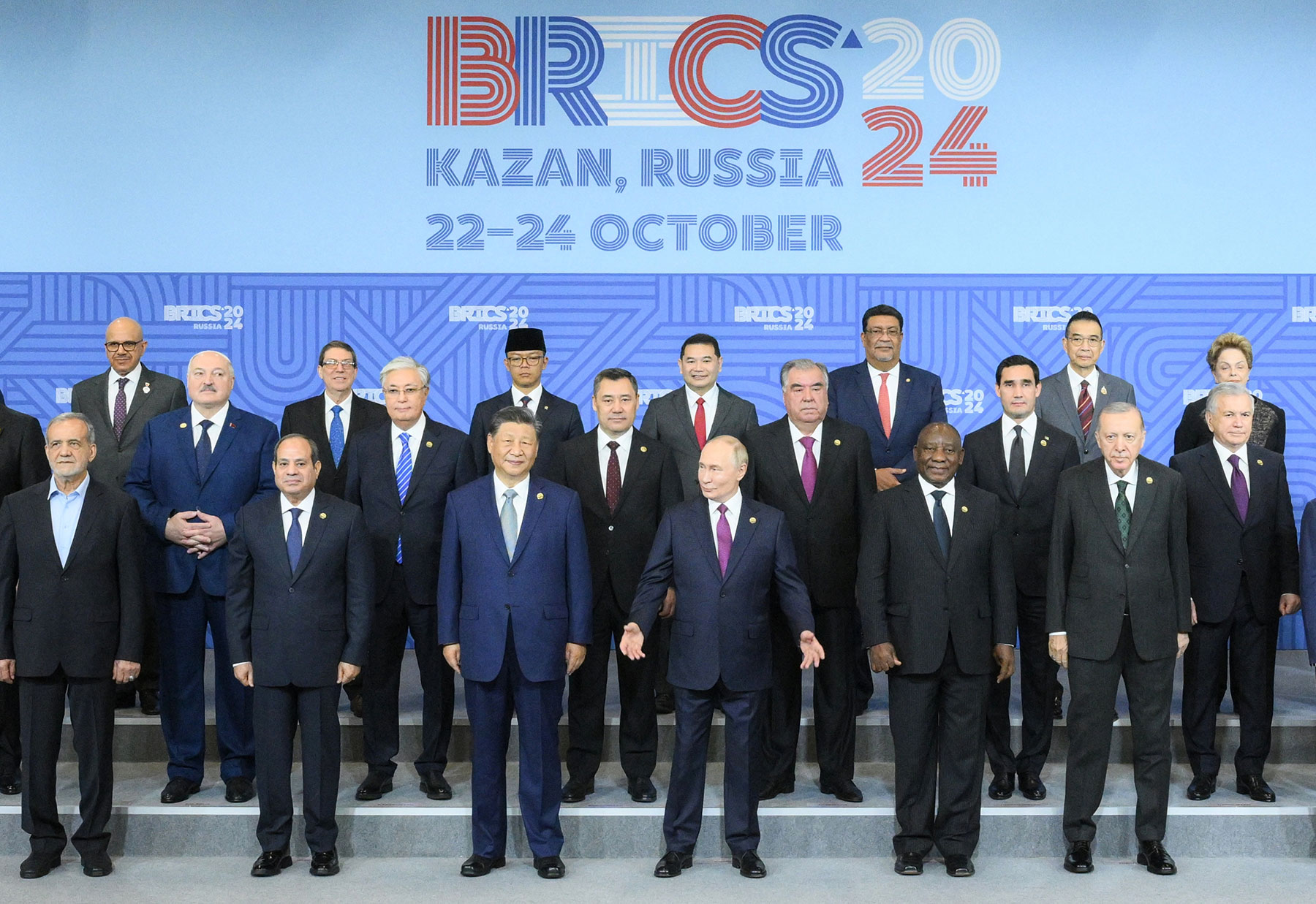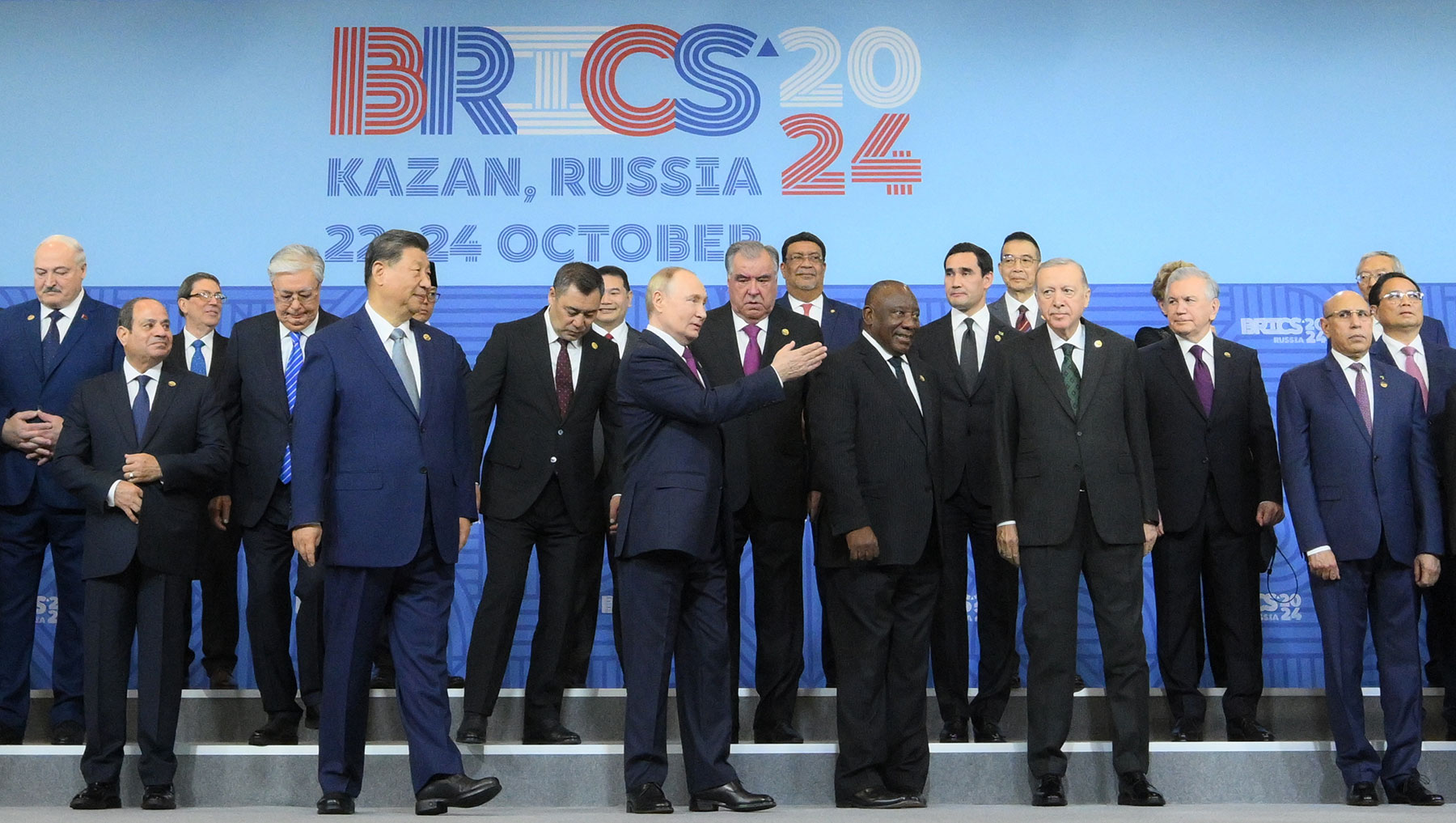The 16th BRICS Summit has just taken place in Kazan, Russia—the first in-person gathering of BRICS leaders since the group's largest enlargement. The economic scale and scope of cooperation within BRICS will grow and interactions among member countries will increase. The meeting signifies the beginning of a new chapter of South-South cooperation led by a stronger BRICS, with its elevated global economic influence and appeal. China, as the largest economy within the group, will play a more pivotal role in promoting BRICS cooperation and push to enhance South-South cooperation.
Nearly twenty years after its inception, the group has become a major engine for world economic growth. After the latest enlargement, the group will exert greater influence in global economic affairs. Currently, BRICS accounts for nearly half of the world's population and one fifth of global trade. The share after BRICS enlargement in global GDP, calculated at purchasing power parity, has increased from 31.6% to 35.6%, surpassing that of the G7. The share of world crude oil exports of BRICS member states has also increased from 15% to 36%. This year, the average GDP growth rate of BRICS countries is expected to be 4%, higher than the G7's forecast of 1.7% and the world's average of 3.2%.
At the closing ceremony of the 2023 BRICS Business Forum, President Xi Jinping pointed out, “one flower alone cannot make a beautiful spring; only blossoming of a rich variety of flowers can bring spring to the global garden”. It is precisely because member countries have diverse cultures and different histories and political systems that exchanges and mutual learning is required for common progress.
Guided by the Global Civilization Initiative, China will continue to uphold the tradition of good neighborliness and friendship, promoting mutual respect and tolerance for differences while learning from each other's strengths among BRICS countries through cultural exchanges.
The significantly enhanced influence and appeal of BRICS cooperation will attract more countries to join the increasingly important platform that allows Global South nations to voice their opinions. BRICS has also enabled these countries to play a more important role in international affairs, promoting the international order to develop in a more just and equitable direction.
As a key member of the group, China will continue to contribute its wisdom from various aspects to promote BRICS cooperation mechanisms to turn it into a primary channel for strengthening solidarity and cooperation among Global South countries, as well as become a vanguard for advancing global governance reform.
The 16th BRICS Summit has just taken place in Kazan, Russia—the first in-person gathering of BRICS leaders since the group's largest enlargement. The economic scale and scope of cooperation within BRICS will grow and interactions among member countries will increase. The meeting signifies the beginning of a new chapter of South-South cooperation led by a stronger BRICS, with its elevated global economic influence and appeal. China, as the largest economy within the group, will play a more pivotal role in promoting BRICS cooperation and push to enhance South-South cooperation.
Earlier this year, BRICS witnessed its largest enlargement, with Saudi Arabia, Egypt, the United Arab Emirates, Iran, and Ethiopia officially joining the BRICS family. This doubled the number of BRICS member countries from five to ten.
The appeal of BRICS as an international group continues to rise. At the 14th Meeting of BRICS High-Ranking Officials held on September 12th, Russian President Vladimir Putin said that another thirty countries had expressed their willingness to cooperate with BRICS or to join BRICS activities in different ways. Several countries have already submitted their applications.
Chinese President Xi Jinping said at this year’s BRICS Summit, BRICS enlargement is a major milestone in the history of the group, and a landmark event in the evolution of international relations. The fact that many countries have successively joined BRICS, applied to join, participated in its activities or have cooperated in BRICS via other forms, demonstrates the group's increasing appeal and vitality. More and more developing countries and emerging economies are moving closer to this group—mostly Global South nations—believing that it can provide them with assistance, support, or more hope and security for development in a world with complex geopolitical situations and increasing uncertainties. These countries also want to become more engaged in global governance, world economic affairs, and international relations.
An Equal and Inclusive Cooperation Mechanism
BRICS, comprising of mostly developing countries and emerging economies, differs from other organizations that are dominated by the United States and a few Western countries. The group has always been committed to contributing to the promotion of an equitable and orderly multipolar world order, and economic globalization that is both universally beneficial and inclusive.
Also, at the Kazan summit, the Chinese president said that it is for the shared pursuit and for the overarching trend of peace and development that BRICS countries have come together. Existing member countries span across Asia, Africa, the Middle East, and Latin America. Indeed, they have come together with a common goal of openness, inclusiveness, and achieving win-win cooperation. These countries uphold an open mindset, embrace diverse political systems and economic development models, participate in development and construction projects, enjoy fair treatment, and achieve mutually beneficial results through sincere cooperation.
BRICS adheres to the principles of never pressuring participating countries to choose sides and never engaging in bloc confrontations, instead always sticking to its role as a driver of global economic growth.
Nearly twenty years after its inception, the group has become a major engine for world economic growth. After the latest enlargement, the group will exert greater influence in global economic affairs. Currently, BRICS accounts for nearly half of the world's population and one fifth of global trade. The share after BRICS enlargement in global GDP, calculated at purchasing power parity, has increased from 31.6% to 35.6%, surpassing that of the G7. The share of world crude oil exports of BRICS member states has also increased from 15% to 36%. This year, the average GDP growth rate of BRICS countries is expected to be 4%, higher than the G7's forecast of 1.7% and the world's average of 3.2%.
Providing Financing for Emerging Economies and Developing Countries
Another major attraction of BRICS lies in its ability to provide financial support for emerging economies and developing countries across various sectors, with the New Development Bank (NDB) serving as the primary channel for achieving this goal. Over the past nine years since its establishment, this multilateral development bank has emerged as a significant new force in the international financial system, granting a total loan of approximately 35 billion US dollars to more than a hundred projects for different countries. The development bank has created a platform for the equitable development of BRICS countries and other emerging economies and developing countries, safeguarding their economic growth and pushing the international financial system towards a more just and equitable direction.
Providing local currency financing is a vital component of the NDB's system. This strategy helps mitigate exchange rate risks faced by the member countries, enhances financing efficiency, and promotes the further development of state capital markets.
In the future, the NDB plans to continue expanding the scope of local currency financing, including increasing the number of loans and investment projects provided in member state local currencies and raising the proportion of local currency financing in total investments. This will bring greater benefits to these countries, including advancing the internationalization of their currencies and enhancing their status and influence in global financial markets.
Economic and Trade Cooperation Between China and BRICS Countries
As the country with the largest economy among BRICS member states, China has continuously deepened cooperation with its BRICS partners, promoting cooperation among BRICS countries to a broader scope and a deeper level. According to data from China’s General Administration of Customs, during the first three quarters, BRICS countries accounted for more than one fifth of global trade. China's imports and exports to other BRICS countries increased by 5.1%, achieving trade complementarity in various fields such as in industry and agriculture.
At this year’s summit, President Xi called for building a BRICS that is committed to innovation to promote the high-quality enhancement of its cooperation. The president said that China is ready to deepen cooperation on innovation with all BRICS countries to unleash the dividends of AI development. He also announced the future establishment of several centers, including the China Center for Cooperation on Development of Special Economic Zones in BRICS Countries and the China Center for BRICS Industrial Competencies.
Thanks to the latest enlargement, BRICS members now include countries with a significant influence in the energy sector, such as Saudi Arabia and Iran. This will further enhance trade complementarity among the member countries and expand the potential for economic and trade cooperation. China, of course, will benefit from the continuously expanding and deepening cooperation, while at the same time inject a new impetus, ideas and models for the development of BRICS cooperation.
Thriving People-to-People Exchanges
Over the years, BRICS countries have engaged in extensive people-to-people exchanges, with diverse and colorful cultures connecting people from different countries, solidifying the BRICS partnership further.
At the closing ceremony of the 2023 BRICS Business Forum, President Xi Jinping pointed out, “one flower alone cannot make a beautiful spring; only blossoming of a rich variety of flowers can bring spring to the global garden”. It is precisely because member countries have diverse cultures and different histories and political systems that exchanges and mutual learning is required for common progress.
Guided by the Global Civilization Initiative, China will continue to uphold the tradition of good neighborliness and friendship, promoting mutual respect and tolerance for differences while learning from each other's strengths among BRICS countries through cultural exchanges.
The significantly enhanced influence and appeal of BRICS cooperation will attract more countries to join the increasingly important platform that allows Global South nations to voice their opinions. BRICS has also enabled these countries to play a more important role in international affairs, promoting the international order to develop in a more just and equitable direction.
As a key member of the group, China will continue to contribute its wisdom from various aspects to promote BRICS cooperation mechanisms to turn it into a primary channel for strengthening solidarity and cooperation among Global South countries, as well as become a vanguard for advancing global governance reform.






